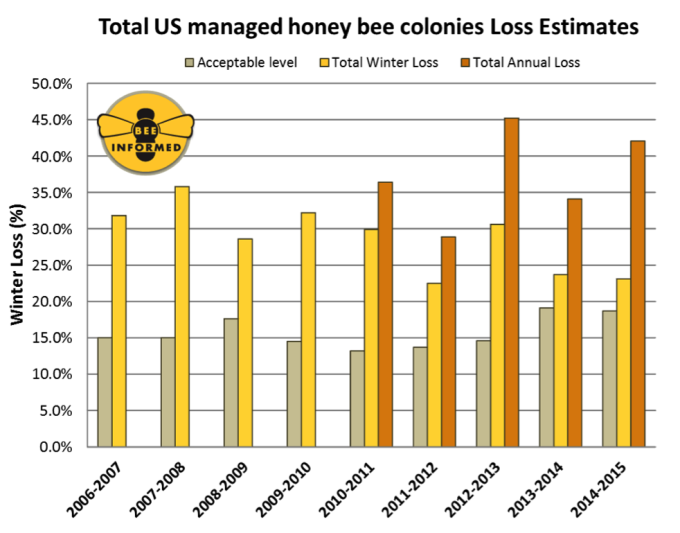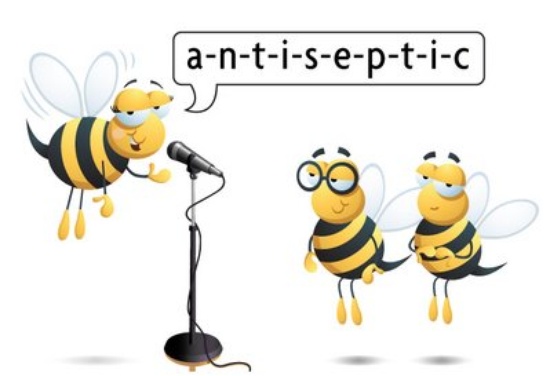What's All the Buzz?
Embedded into the values of ancient Roman history, beekeeping is one of the oldest agricultural practices to date. In fact, the beehive was recognized by the Romans as a paradigm for the ideal society: the bee's sole purpose is to serve its hive. The division of labor is meticulously specialized, such that one single bee cannot survive on its own for long, and, thus, the bee is not only one of the most biologically well-adapted organisms on the planet, but also exemplary of life that exists because of the community, not the individual.
"Insect pollination is integral to food security in the United States. Honey bees enable the production of at least 90 commercially grown crops in North America. Globally, 87 of the leading 115 foods crops evaluated are dependent on animal pollinators, contributing 35% of global food production. Over the past few decades, there has been a significant loss of pollinators from the environment. The problem is serious and poses a significant challenge that needs to be addressed to ensure the sustainability of our food production systems, avoid additional economic impacts on the agricultural sector, and protect the health of the environment."
- The United States White House, 2014.
In the United States, honey bees are responsible for approximately $15 billion in annual agricultural revenue, contributing to the prosperity of many beloved foods, such as apples, almonds, broccoli, cucumbers, alfalfa, cantaloupes, oranges, carrots, avocados, berries, and, of course, honey.
Yet, honey bee hives have been declining at an alarming rate - attributed by experts to a catchall condition most commonly known as Colony Collapse Disorder (CCD).
Both the origin and cure of CCD have yet to be fully understood, but CCD has been examined in detail by entomologists and determined to be largely caused by the conflux of insecticides and pesticides that contaminate the honey bee's pollen - pollen that is vital for the survival of the hive. According to the U.S. Department of Agriculture, scientists are further examining four general catalysts of CCD:
- Pathogens - among others, Nosema and Israeli Acute Paralysis Virus.
- Parasites - varroa mites commonly found in honey bee colonies inflicted with CCD.
- Management stressors - poor nutrition due to apiary overcrowding and migratory stress resulting from nationwide transportation.
- Environmental stressors - lack of diversity in nectar/pollen, pollen with low nutritional value, limited access to water, and/or access to contaminated water only.
Insights from a recent report published by the U.S. White House, and confirmed by the U.S. Department of Agriculture, indicate that the total number of managed honey bee colonies in the United States has decreased from 6 million colonies in 1947, to 4 million in 1970, to just 2.5 million remaining colonies today. The opportunity cost of lost beehives is multi-billions of dollars.
The Honey Bee Population Is Declining...But, Just How Important Are Bees?
The College of Agricultural & Environmental Sciences at the University of Georgia recently published an academic paper, digging further into this very question: "On Einstein, Bees, and Survival of the Human Race."
"This sounds presumptuous, doesn't it? I mean, lumping bees alongside weighty stuff like survival of the human race. But the fact is, associations like this do get bantered about, especially in times like ours when the welfare of pollinators is a hot topic. Politicians, taxpayers, and agriculturalists are asking, 'So, just how important are bees?'".
The paper discusses the reality of honey bees as well as a multitude of myths that have prevailed, as beekeepers, for one, have been quick to answer such a question on the high end of the importance spectrum, often endorsing quotes like: "If the bee disappeared off the surface of the globe, then man would only have four years of life left."

This aforementioned quote has been attributed time and time again to Albert Einstein, but there exists not a single thread of evidence that Einstein actually stated such a thing; in fact, one can almost be certain that he did not.
But the underlying essence of the quote begs one to wonder: is human life actually dependent on the bee?
Bees: A Rich Man's Problem?
Honey bee pollination is immensely important for the diverse food supply and economy of the United States, as well as the food supply of similar developed countries.
The state of California alone imports 60% of the U.S. honey bee population (approximately 1.4 million beehives) each year just to pollinate one crop: almonds. In other words, one food group, in one state, is dependent on 60% of the entire U.S. honey bee population.
However, as the author of the University of Georgia research paper, Professor Keith S. Delaplane, astutely notes: it is not that all human lives are dependent on honey bees for survival, rather, certain crops would cease to exist in the absence of bee pollination, and thus, some geographic regions are more affected than others. Consequently, declining honey bee hives has been referred to as a "rich man's problem", as there are a multitude of nations that are not afforded the opportunity of enjoying a diverse food supply and, thus, are relatively unaffected by the honey bee (or, the lack thereof).
Nonetheless, even more commonly proclaimed than "Einstein's quote" is the statement: "Honey bees are responsible for one of every three bites of food we eat."
As is often the case with quotations that transcend the decades, this popular credo has been "adapted", in this particular case from a 1976 statement by S.E. McGregor: "It appears that perhaps one-third of our total diet is dependent, directly or indirectly, upon insect-pollinated plants." Even in 1976, it seems reasonable to conclude that this statement was based on anecdotal evidence only, and not applicable in the broad sense, but rather reflective of affluent economies in which dairy and other products that depend on pollination are abundant.
The United Nations Food and Agriculture Organization (FAO) has been seeking to answer this very question: "How important is animal-vectored pollination?"
The U.S. FAO concluded that 5% of the global food production in industrialized nations and 8% in the developing world is dependent on animal pollination - percentages far lower than that proclaimed by S.E. McGregor.The cause of the discrepancy is that approximately 75% of the world's crops benefit to some magnitude from animal pollination, but only 10% of this 75% are fully dependent.But there is another trend manifesting. *Source: https://beeinformed.org/results/colony-loss-2014-2015-preliminary-results/
*Source: https://beeinformed.org/results/colony-loss-2014-2015-preliminary-results/
The global demand for pollinated crops is increasing at a pace that is in direct conflict to the death of the honey bee. In other words, the percentage of total food production from animal-pollinated crops is growing at an ever-increasing rate - a trend that shows no signs of slowing.
In 2014, the United States White House published: Fact Sheet: The Economic Challenge Posed by Declining Pollinator Populations.
Pollinators contribute substantially to the economy of the United States and are vital to keeping fruits, nuts, and vegetables in our diets. Given the breadth, severity, and persistence of pollinator losses, it is critical to expand Federal efforts and take new steps to reverse pollinator losses and help restore populations to healthy levels.
The simple truth is that the demand for ice cream, blueberries, watermelon, coffee, etc. is growing faster than the remaining honey bees can handle. Consider the fact that an extinction of the honey bee would be absolutely devastating for California almonds or Costa Rican coffee.
Nonetheless, it must be noted that it is inaccurate to proclaim that, senso stricto, humans would cease to exist without the honey bee - and, perhaps beekeepers attributing falsified quotes to Einstein and perpetuating such exaggerations are doing themselves a disservice. But, there is validity in the notion that honey bee colonies are rapidly declining and if one is fortunate enough to live in a geographic region where bees are responsible for a diverse food supply, than honey bees are, indeed, immensely important.
 Declining beehives = UnBEElievably Unsustainable:
Declining beehives = UnBEElievably Unsustainable:
Not only are bees essential for the production of many of the food groups we know and love, but the declining bee population also results in increased transportation needs, as states like California who require 60% of the bee population for its almonds must import bees from other areas of the nation. This increased need for transportation directly increases CO2 emissions.
During the winter season, most commercial beekeepers use trucks to transport their bee colonies to farms in California, Texas, and other warmer states. Additionally, due to poor management on behalf of agricultural farmers, many farms myopically focused on short-term profits, nurture just one cash crop. As a result, there exist far fewer plants today that can pollinate.
Thus, it should be noted that pollination is not solely important for the food it directly impacts, but honey bees indirectly impact greenhouse gas emissions, and the agricultural industry as a whole. Consider the fact that honey bees are crucial for crops like clover and field beens, which are used to feed the livestock we depend on to put meat on our plates.
The path ahead: Does the world need a "PlanBee?"
The U.S. Department of Agriculture (USDA) is by no means taking this issue lightly. In 2014, the USDA announced it would be providing a "$3 million subsidy in order to help the one animal on the planet that will either make or break food prices."
In 2014, the White House published a memorandum: Creating a Federal Strategy to Promote the Health of Honey Bees and Other Pollinators, through which President Barack Obama established the following:
$50 million of the 2015 budget to be allocated towards: a pollinator health task force, co-chaired by the Secretary of Agriculture and the Administrator of the Environmental Protection Agency (EPA), the development of a National Pollinator Health Strategy, a pollinator Research Action Plan, a public Education Plan, and encouragement of public-Private Partnerships, among other initiatives in attempts to save the honey bees.
What can I do if I don't want to maintain a beehive in my backyard?
On the individual level, one can support local beekeepers by purchasing products from organic farmer's markets (particularly local honey), planting foods that bees can safely consume, and, importantly, avoiding the use of pesticides.
Pollination, the process of flowering plant reproduction that involves the transfer of pollen grains from the male (the anther) to the female (stigma) of the same, or another plant of the same species, occurs when fertilized egg cells grow into seeds which are then spread to help grow many of the fruits and vegetables we have become accustomed to seeing on our plates.
The transfer of pollen can be accomplished not only through honeybees, but also through the wind, birds, bats, mammals and other insects - however, the honeybee is the single most important insect for pollination on a large commercial scale.
The agricultural state of affairs: An interesting tug-of-war between big farmers and beekeepers:
While the exact cause of CCD remains elusive, there exists a widespread agreement that the repeated exposure of pesticides is killing the bees. However, according to farmers (and pesticide companies), monocultures require intervention in order to survive in the current state of the ecosystem. Pesticides keep away the insects that prevent organic farming.
Interestingly, some theorize that the Environmental Protection Agency (EPA) is not actually incentivized to mitigate the bee problem, because the EPA profits from the use of pesticides: pesticide companies pay to keep the EPA funded. This is a similar curiosity to pondering about a company like Nike that wishes to be a paradigm of corporate social responsibility, yet profits from a model of consumption. And, indeed in the eyes of many beekeepers, the system is corrupt and should be overhauled. Farmers who are dedicated to maintaining a farm through natural methods of keeping insects away are teaming up with beekeepers to bridge the education gap and diminish the existence of pesticides. But very few all natural farms remain today, as small time farmers trying to make a living through natural harvesting are faced with the following predicament: use inorganic farming methods or risk being bought out or coerced out of business by the larger farming corporations that are simply profiting faster.
The larger picture:
Somewhat paradoxically, the honey bee, traditionally considered a pest by most as they crash picnics, hurt when they sting, and build hives in inconvenient locations, are actually hugely beneficial to human quality of life, particularly through the diverse food supply the honey bee enables.
In the words of renowned chef Dan Barber, we must accept what the environment presents, rather than inflict demands.


